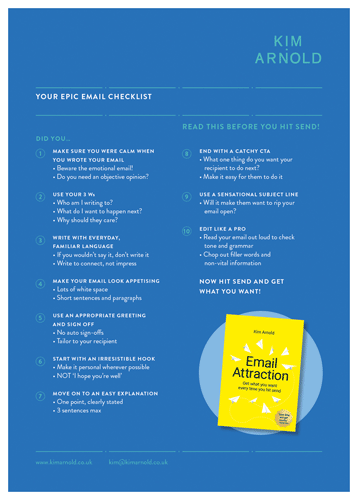Whoa! Last week’s email caused a stir.
I asked if it was the end of upper-case letters in emails. The answer was a resounding, emphatic – some might say fricking furious – ‘NO!’
Many of you told me you class yourselves as ‘old school’. Emails without good grammar, spelling and punctuation are ‘just lazy’:
‘Busyness is just an excuse.’
‘Plain rude.’
‘It shows a lack of respect for me the reader.’
‘Long live the grammar police.’
Emotions certainly run high when it comes to modern email etiquette – whether you’re old school, new school or somewhere in between. (I’m writing a brand new chapter on it for the next edition of Email Attraction.)
Factors like the pandemic, multi-generational workplaces and texting and messaging platforms have ripped up the email rulebook and flung it out of the window.
I’m contacted almost daily by both press and clients asking what’s acceptable these days:
- Can you put kisses on the end of emails? ????
- How should you sign off – with kind regards, best wishes or cheers? ????
- What about emojis? ????♀️
And that’s before you’ve even got to the juicy part – how to actually get people to reply to you.
A research report published in March this year by Blunden and Brodsky at the University of Texas looked at ‘Virtual Impression Management’ i.e. how we come across to other people when we’re online.
The findings were fascinating:
- Emojis generally increase your warmth, but might undermine your perceived competence ????
- Exclamation marks boost your friendliness, but also reduce your perceived seniority ‼️
- FULL CAPS MAKE YOU LESS LIKEABLE (but we knew that already, didn’t we?)
- Typos and errors generally worsened impressions
- Greetings and sign offs, if well written, generally improved impressions, or kept them neutral, depending on the context
What do you reckon? Sound about right? Or do you have a different take? I’d love to know.
And do let me know about any other aspects of modern email etiquette you struggle with or have noticed in others.


